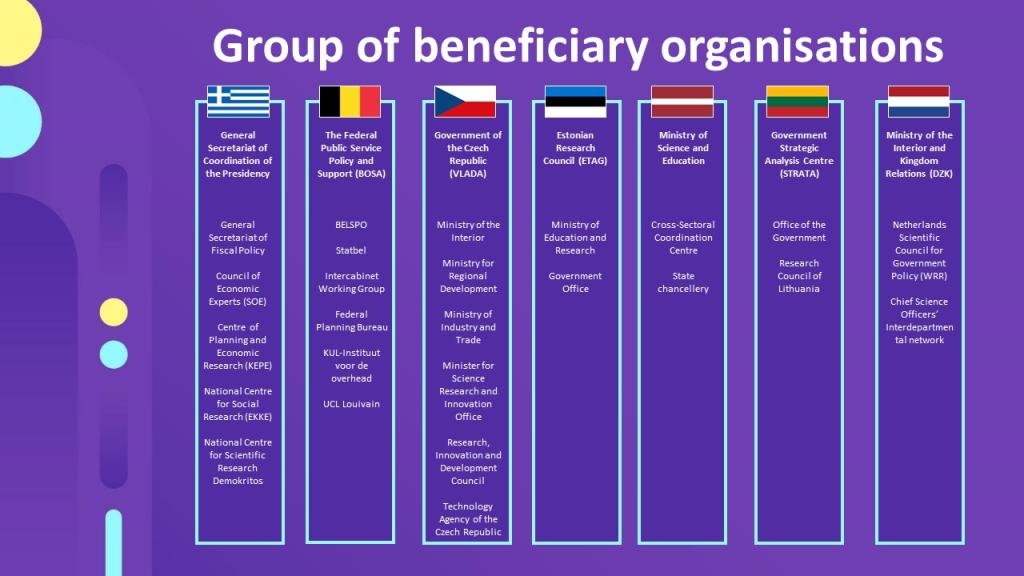Brief me
- This is a 2-year project to promote reforms in the public administration and research and innovation systems for better evidence-informed policymaking.
-
Seven Member States will benefit from this support: Greece, Belgium, Czech Republic, Estonia, Latvia, Lithuania, and the Netherlands, bringing a wide range of organisations from the centre of government to research and academia.
-
The project entails country analyses with tailor-made recommendations for reform implementation; capacity-building workshops to develop competences in researchers, policymakers, and knowledge brokers; and thematic symposia delivering international mutual learning exercises.
-
This is a Technical Support Instrument project, funded by Directorate-General for Structural Reform Support (DG REFORM), and implemented by the Joint Research Centre (JRC) and the Organisation for Economic Co-operation and Development (OECD)
Why we do this
-
Societies face complex problems that affect different government departments, governance levels, and actors (Covid-19, climate change…). To address them, public administrations need to reinvent themselves to deploy better knowledge-intensive policies and deliver valuable and sustainable results for their citizens.
-
Covid-19 highlighted the role of scientific knowledge in policy- and decision-making. But it has also revealed frictions at the science-policy interface (scientific uncertainty, misinformation, contestation of experts, and lack of coordination between advisory bodies within and between countries).
-
Evidence-informed policymaking (EIPM) requires building and connecting capacity for knowledge exchange between scientists and policymakers, and an enhanced policy coordination and cooperation between government departments and levels.
-
Science-for-policy ecosystems need knowledge brokers and boundary organisations linking research and policymakers, as well as networks of ministerial science advisers and analytical units across government. Yet, there is often informality and lack of transparency in these systems, insufficient resources for knowledge mobilisation and management in public administration, and a lack of coordination between the different actors.
Therefore, seven EU Member States countries—Greece, Belgium, the Czech Republic, Estonia, Latvia, Lithuania, and the Netherlands—have requested technical support in the area of Capacity for Evidence-informed Policymaking in Governance and Public Administration from the European Commission. This support will help them improve the effectiveness of their public administrations, through greater capacity for supply and uptake of scientific knowledge, evaluation and evidence in policymaking.
Where we do this
This project will support seven EU Member States, and in particular a diverse group of beneficiary organisations within each country involving Prime Minister Offices, strategic decision-making centres, budget ministries and fiscal councils, other ministries from interior or regional development to science and higher education, scientific advisory councils, research councils, among other academic and innovation organisations.
What we do
The expected long-term impact of this project is the reinforced institutional integration of the use of evidence, science and evaluation for policymaking. Our short/medium term outcomes are:
-
Outcome A: Improved capacity for EIPM in governance and public administration in a post-pandemic Europe and,
-
Outcome B: Increased awareness, recognition and understanding at the political level, and in the scientific communities, of the actions and investments required for science and evidence to be able to contribute to well EIPM.
How we do this
We will achieve these objectives through the following set of activities:
1. Country analyses
Each country will receive a comprehensive assessment by the JRC and the OECD, with support of external experts.
This assessment will comprise the production of diagnostics, needs assessment, and country roadmap reports, which will link the evaluation results with political priorities and ongoing reforms.
The evaluation will be based on desk-research, surveys, interviews, focus groups, participatory workshops and other methodologies.
A common approach will be followed in all countries to enable comparisons, but it will also be adapted to each particular context.
2. Capacity-building workshop
International exercises to build competences will be delivered bringing together professionals from the seven EU Member States.
Three workshops will support scientists to maximise their impact in EIPM processes, following the “Training of Trainers (ToT) – Evidence for policy course” already delivered by the JRC since 2021 to tens of pairs of scientists and facilitators across Europe.
Two workshops will support policymakers to build up capacity for EIPM (dealing with evidence, stakeholder engagement, policy evaluation and scientific literacy, among others). These workshops will draw on the JRC’s competence framework for innovative policymaking and the OECD skill set for EIPM.
One workshop will support knowledge brokers and knowledge mobilisation units addressing their challenges in navigating science and policy and setting up new networks or boundary organisations.
3. Thematic symposia
international mutual learning exercises will bring different actors from the participating EU Member States to promote exchange of practices between them, the European Commission, and the OECD.
The exact topics for these three thematic symposia will be decided shortly, but it may involve the long-term impact of COVID-19 and institutional structural changes; deliberative democracy in public governance; policy evaluation in public administration; strategic foresight and anticipatory governance; among others.
Partners and Expert groups
 |
 |
 |
Next Events
-
16th February – National Kick-off Event in Belgium
-
21st February – National Kick-off Event in Greece
-
7th March – National Kick-off Event in the Netherlands
-
10th March – National Kick-off Event in the Czech Republic
-
27th March – National Kick-off Event in Latvia
-
30th March – National Kick-off Event in Estonia
-
3rd April – National Kick-off Event in Lithuania
Latest knowledge from this Project
More information
| Project date |
to |
| Originally Published | Last Updated | 08 Dec 2022 | 24 Jan 2023 |
| Knowledge service | Metadata | Evidence-Informed Policy Making |
Share this page

